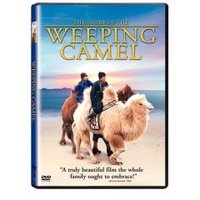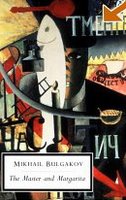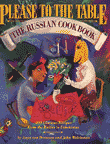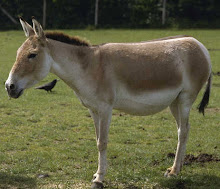First, a film and a book --
 The National Geographic feature film Story of the Weeping Camel, isn’t exactly a documentary and isn't exactly fiction, but a little of both. It’s filmed in the Mongolian desert, and tells the story of a rare baby white camel that is rejected from birth by its mother. The family of herders try one strategy after another to encourage, teach, trick and cajole the mother camel into caring for the starving and sad baby until at last, traditional Mongolian music and song break through to her stony heart. The daily life and customs of these nomads seems very similar to that of the ethnic Kazakhs, who also live in Mongolia and China in addition to Kazakhstan. The portrayal of the family of nomads -- a cluster of three gers (the Mongolian yurta) houses young parents with two sons, and two sets of grandparents -- makes clear details that are hard to figure out from just words and pictures. How exactly do those flaps on the yurta work? Seeing the father prepare for an impending sandstorm explains all.
The National Geographic feature film Story of the Weeping Camel, isn’t exactly a documentary and isn't exactly fiction, but a little of both. It’s filmed in the Mongolian desert, and tells the story of a rare baby white camel that is rejected from birth by its mother. The family of herders try one strategy after another to encourage, teach, trick and cajole the mother camel into caring for the starving and sad baby until at last, traditional Mongolian music and song break through to her stony heart. The daily life and customs of these nomads seems very similar to that of the ethnic Kazakhs, who also live in Mongolia and China in addition to Kazakhstan. The portrayal of the family of nomads -- a cluster of three gers (the Mongolian yurta) houses young parents with two sons, and two sets of grandparents -- makes clear details that are hard to figure out from just words and pictures. How exactly do those flaps on the yurta work? Seeing the father prepare for an impending sandstorm explains all.10/2/2006 -- National Geographic has a great website for this film, with lots of additional information on the land, people, traditions and animals of the Gobi Desert.
 Then north and west to Russia: After a third person said to me "surely you've read The Master and Margarita
Then north and west to Russia: After a third person said to me "surely you've read The Master and MargaritaNext stop, to Uzbekistan, the country that shares the Aral Sea with Kazakhstan, with Chasing the Sea: Lost Among the Ghosts of Central Asia, by former Peace Corps volunteer Tom Bissell. More about this fascinating book next time . . .


No comments:
Post a Comment